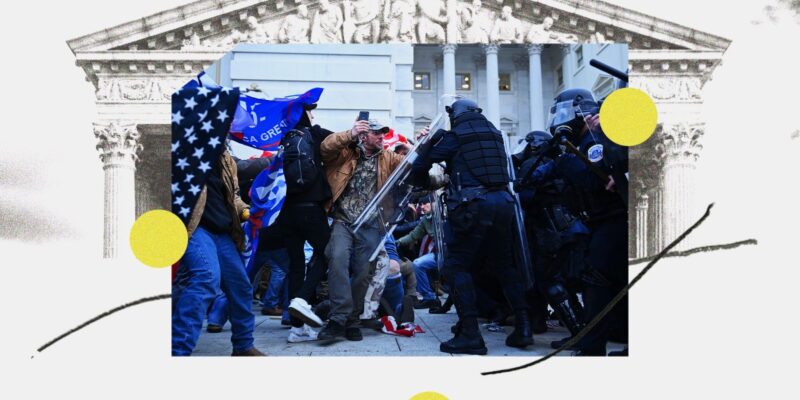
The Supreme Court on Friday ruled that the Justice Department had improperly wielded a federal obstruction law in prosecuting hundreds of people for their roles in the January 6 attack on Congress.
The court’s decision focused on the DOJ’s use of a statute—enacted in 2002 after the Enron accounting scandal—that prohibits obstructing a federal proceeding. Writing for the majority, Chief Justice John Roberts said the law applied only when the defendant’s actions impaired, or attempted to impair, the integrity of actual physical evidence. The DOJ’s reading gives prosecutors too much discretion to seek a 20-year maximum sentence “for acts Congress saw fit to punish only with far shorter terms of imprisonment,” Roberts said.
The court’s 6-3 majority included five conservative justices, but also liberal Justice Ketanji Brown Jackson.
“We should be wary of finding that a statute addresses significant criminal conduct when none of the available indicia of congressional intent, including the prohibition’s placement, suggest that Congress intended that result,” Jackson said a concurrence.
Justice Amy Coney Barrett, a Trump appointee, dissented. Barrett, who was joined by Justices Sonia Sotomayor and Elena Kagan, said the majority’s reading required “textual backflips to find some way—any way—to narrow the reach” of the law.
The impact of the court’s ruling on January 6 cases may not be as far-reaching as many anticipated when it took up the case. Federal prosecutors have charged more than 350 people involved in the attack on Congress with violating that law at issue, while more than 1,400 Americans accused of being involved in the attack have been hit with criminal charges. Just 27 are serving time in prison on only obstruction charges, according to the Washington Post.
The Justice Department, anticipating the court’s ruling, had already stopped using the obstruction charge in January 6 cases. Courts will now likely have to resentence around 100 people already sentenced under the law that SCOTUS says shouldn’t apply.
The case is one of two before the court that could impact the criminal charges special counsel Jack Smith brought last year against Donald Trump over his efforts to retain power. Two of the four charges against Trump in Smith’s election interference case involve the same obstruction statute.
But it’s not clear whether Trump will benefit from this ruling. Smith had argued that the obstruction charges against Trump should stand even if the high court narrowed the application of the law, as it did Friday. That’s because Trump’s effort to create slates of fake presidential electors is an example of falsifying evidence, which falls more squarely under the provision than storming Congress, Smith contends.
Supreme Court justices Samuel Alito and Clarence Thomas participated in Friday’s ruling—both joined the majority—despite controversies that have led to calls for their recusal.
Alito declined to stay out of the case despite a New York Times report that an upside-down American flag flew on a pole at his Alexandria, Va., home in the days after the January 6 attack. Many Trump supporters, including January 6 attackers, used upside-down flags at the time signal support for Trump’s lies about the 2020 election.
Judges, including Supreme Court justices, are supposed to avoid even the appearance of bias. The display outside his home of the same seditionist symbol favored by Capitol rioters would seem to put Alito squarely on the wrong side of that ethical guidance.
But Alito said in a letter to Democratic senators that it was his wife who had flown the flag and that he was powerless to stop her. “My wife is a private citizen, and she possesses the same First Amendment rights as every other American,” wrote Alito, the author of the court’s decision ending women’s abortion rights in much of the country. “She makes her own decisions, and I have always respected her right to do so.”
“My wife is fond of flying flags,” Alito added. “I am not.”
Thomas has declined to recuse himself from January 6-related cases despite the involvement of his wife, Ginni Thomas, in lobbying for efforts to overturn Trump’s electoral defeat. (Thomas did recuse himself from considering an appeal by his former law clerk John Eastman, a key architect of plans to overturn 2020 election, of a lower court ruling that allowed the House January 6 committee to review his emails, but the matter was moot by that time.)
The Supreme Court is has yet to rule on Trump’s claim that he has “absolute immunity” from any prosecution related to his presidential powers—a case that could further delay, or entirely derail, Smith’s election interference prosecution. Alito and Thomas have not recused themselves from that case either.















